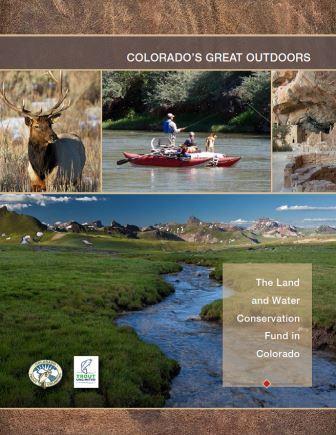Land and Water Conservation Fund
 At the end of this month, the Land and Water Conservation Fund is set to expire unless reauthorized by Congress. Established in 1964 through a bipartisan act of Congress, the fund uses royalties paid by energy companies drilling for oil and gas on the Outer Continental Shelf to conserve important natural resources and expand access to public land. The money comes from a maximum of $900 million in royalty payments collected annually from oil and gas companies, not from taxpayer dollars.
At the end of this month, the Land and Water Conservation Fund is set to expire unless reauthorized by Congress. Established in 1964 through a bipartisan act of Congress, the fund uses royalties paid by energy companies drilling for oil and gas on the Outer Continental Shelf to conserve important natural resources and expand access to public land. The money comes from a maximum of $900 million in royalty payments collected annually from oil and gas companies, not from taxpayer dollars.
The Land and Water Conservation Fund enables access to millions of acres of public land and has expanded access to millions more, all while strengthening habitat for fish and game. Approximately $239 million has been invested from LWCF grants into Colorado’s great outdoors. Those grants typically are matched by an equal amount of state or local money, thus doubling the federal investment.
Studies have found that every dollar invested in land acquisition or improvement generates a $4 return for communities. And U.S. hunters and anglers comprise a powerful economic engine, annually contributing close to $90 billion to the nation’s economy and supporting 1.5 million jobs. The broader outdoor recreation and conservation economy is responsible for more than $646 billion in consumer spending every year.
Recently, the Land and Water Conservation Fund has been used to acquire the 11,179-acre Devil’s Canyon Ranch in Wyoming, a premier hunting area with important herds of bighorn sheep, mule deer and elk; to protect the working forests around Wisconsin’s Chippewa Flowage, one of that state’s most pristine lakes and best trophy fisheries; to secure habitat in the Dakota grasslands for more than 100 breeding birds, including 12 waterfowl species, in a region that has been described as America’s “duck factory;” and to protect the confluence of the Ohio and Tradewater rivers in Kentucky, an action that is providing significant watershed and water quality improvement to the benefit of public hunting and fishing.
As rural lands across the country continue to disappear, public access to federal lands will become increasingly important, and the Land and Water Conservation Fund will play a vital role in unlocking millions of federal acres currently unavailable to sportsmen. The fund is essential to make public lands public by securing recreation access, particularly where opportunities for sportsmen and others to access public lands are limited or precluded.
Please ask your Senators and Representatives today to support permanent reauthorization of LWCF, so that it can continue to benefit our public lands and Colorado’s multi-billion dollar recreation economy.
Click HERE to submit a TU form to your congressman.
Senators Bennet and Gardner are both on record supporting LWCF – urge them to keep up the fight to get this program approved. Our House delegation has split on the issue; please ask them to step up and ensure that LWCF’s benefits continue to flow to Colorado and our great outdoors.
Thank you for helping make a difference for our public lands and outdoor recreation!
